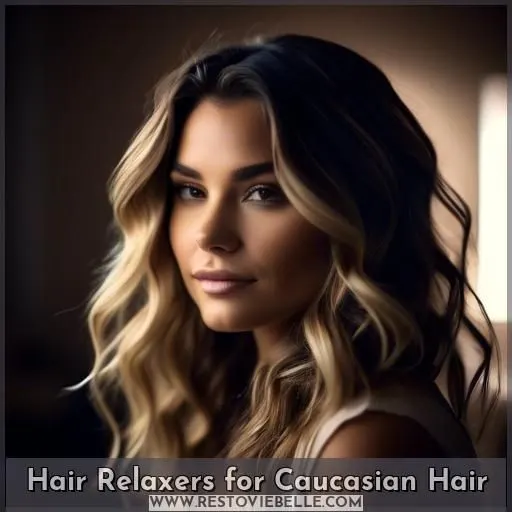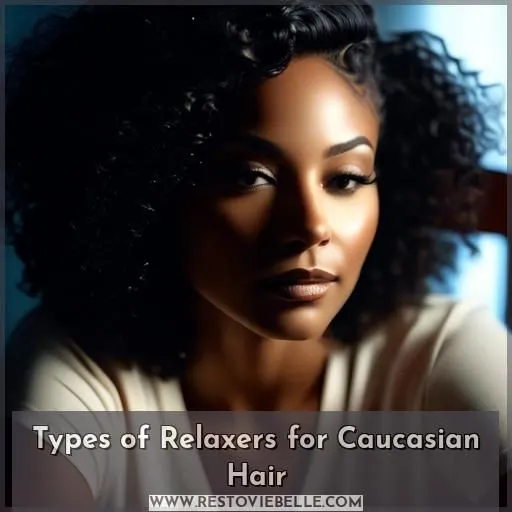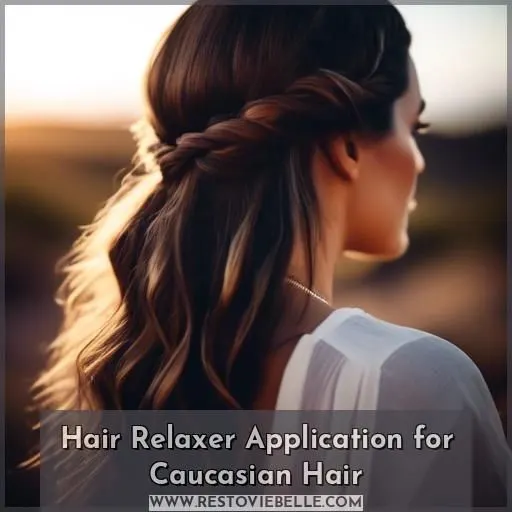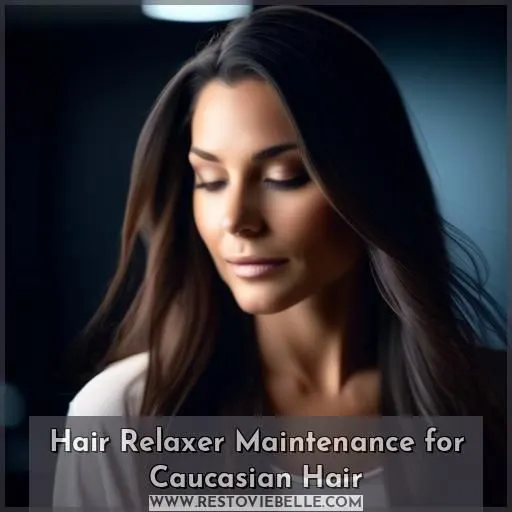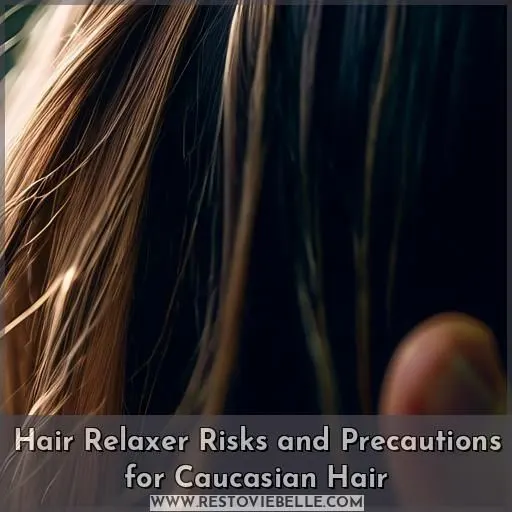This site is supported by our readers. We may earn a commission, at no cost to you, if you purchase through links.
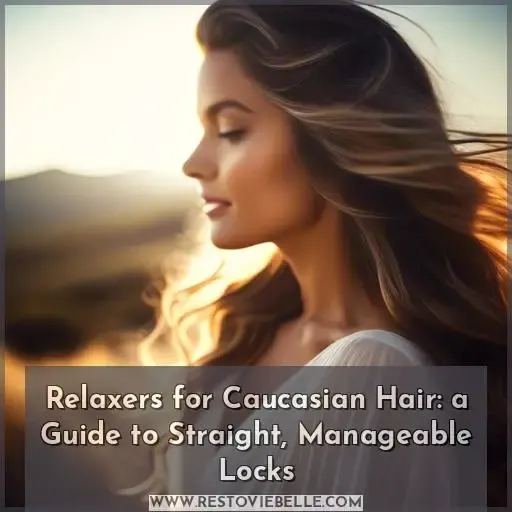 Relaxers are designed to straighten curls, waves, and frizz in Caucasian hair. They contain ingredients like ammonium thioglycolate or guanidine hydroxide. You’ll want to choose a thio relaxer, recommended for your hair type. Properly prepare, apply starting at the ends, protect your scalp, and rinse thoroughly after the prescribed time.
Relaxers are designed to straighten curls, waves, and frizz in Caucasian hair. They contain ingredients like ammonium thioglycolate or guanidine hydroxide. You’ll want to choose a thio relaxer, recommended for your hair type. Properly prepare, apply starting at the ends, protect your scalp, and rinse thoroughly after the prescribed time.
Deep conditioning, protective styles, and daily moisturizing are crucial for maintenance. Be cautious, as improper use risks breakage, irritation, and damage. Have a professional apply the relaxer for caucasian hair to ensure optimal results and reduce risks.
For comprehensive guidance on achieving straight, manageable locks, let’s explore further.
Table Of Contents
- Key Takeaways
- Hair Relaxers for Caucasian Hair
- Types of Relaxers for Caucasian Hair
- Hair Relaxer Application for Caucasian Hair
- Hair Relaxer Maintenance for Caucasian Hair
- Hair Relaxer Risks and Precautions for Caucasian Hair
- Frequently Asked Questions (FAQs)
- Is it safe for Caucasians to use relaxers designed for Black people?
- What are the differences between relaxers specifically designed for Caucasian hair and those for Black people?
- How often should Caucasians with relaxed hair shampoo their hair?
- Are there any specific precautions Caucasians should take when using relaxers?
- Can Caucasians use relaxers to achieve a more textured or curly look, or are they only for straightening?
- Conclusion
Key Takeaways
- Hair relaxers for Caucasian hair are designed to straighten and smooth out curls, waves, and frizz, making it easier to style and maintain.
- There are different types of relaxers available for Caucasian hair, such as those with ammonium thioglycolate or guanidine hydroxide as active ingredients.
- It’s essential to consider individual hair type and condition when using hair relaxers, as well as to do a strand test before using an at-home relaxer and consult a professional for color-treated or previously relaxed hair.
- Alternatives to hair relaxers for Caucasian hair include straightening combs, flat irons, and other styling tools that can help manage frizz and achieve a more manageable look.
Hair Relaxers for Caucasian Hair
Hair relaxers for Caucasian hair are a popular choice for those looking to achieve a straight, manageable look. These products are designed to straighten and smooth out curls, waves, and frizz, making hair easier to style and maintain. Hair relaxers work by breaking down the protein bonds in the hair, allowing it to be combed straight and then neutralized to stop the bond-breaking process.
There are several types of relaxers available for Caucasian hair, including those with ammonium thioglycholate or guanidine hydroxide as active ingredients, which are often referred to as no lye relaxers. These products are gentler than those containing sodium hydroxide and are better suited for fine or delicate hair. However, they can still cause damage if used improperly.
When considering hair relaxers for Caucasian hair, it’s essential to consider the individual’s hair type and condition. Fine, textured, or heat-damaged hair will typically require less relaxing time than coarse hair. Always do a strand test before using an at-home relaxer, and consult a professional for color-treated or previously relaxed hair.
It’s also important to note that chemical hair relaxers can have potential risks, such as hair breakage and even temporary bald patches if the application time or hair condition is misjudged. To minimize damage, relaxers must be timed precisely, and the hair should be checked frequently during the process.
Alternatives to hair relaxers for Caucasian hair include straightening combs, flat irons, and other styling tools that can help manage frizz and achieve a more manageable look. It’s essential to consider the specific needs of your hair and consult with a professional stylist to determine the best approach for your individual situation.
Types of Relaxers for Caucasian Hair
Caucasian hair comes in various textures, from straight to coarse and curly, and relaxers can be a popular choice for those seeking straight, manageable locks. Relaxers for Caucasian hair are available in different types, including those specifically designed for white women and those marketed towards Black people. These products contain active ingredients like ammonium thioglycholate or guanidine hydroxide, which break down hair protein bonds to straighten the hair.
To apply relaxers to Caucasian hair, it’s essential to follow the instructions carefully. This may involve mixing the relaxer with other ingredients, such as olive oil or a moisturizing hair conditioner, and applying it to the hair with fingers, ensuring each strand is well-covered. The relaxer is then left on the hair for a specified period, usually mentioned on the product’s packaging, before being rinsed off and neutralized with an acidic shampoo to restore moisture and improve hair texture.
Aftercare instructions for hair relaxers include using a moisturizing conditioner to restore moisture and improve hair texture, as well as avoiding excessive heat styling and tight hairstyles that can cause breakage. It’s also essential to protect the scalp during the application process and avoid double-processing the hair, which can lead to damage.
The long-term effects of relaxers on Caucasian hair can include hair damage and potential chemical burns if not used correctly. It’s crucial to consult a professional stylist for application and to follow the manufacturer’s instructions carefully to minimize damage.
Hair Relaxer Application for Caucasian Hair
- Choose the Right Relaxer: For Caucasian hair, it’s essential to select a relaxer specifically designed for your hair type. Thio relaxers, which contain thioglycolate, are often recommended for curly, wavy, or Caucasian hair.
- Prepare Your Hair: Before applying the relaxer, ensure your hair is clean and free of any oils or styling products. This will help the relaxer penetrate your hair more effectively.
- Apply the Relaxer: Apply the relaxer to your hair, starting at the ends and working your way up to the roots. Be sure to follow the manufacturer’s instructions carefully, as over-application can lead to damage.
- Protect Your Scalp: To prevent scalp irritation, apply a base cream or protective barrier to your scalp before applying the relaxer.
- Monitor the Process: Keep an eye on your hair during the relaxer application process. If you feel any discomfort, such as prickling or burning, it’s essential to inform your stylist immediately.
- Rinse and Condition: After the relaxer has been left on for the recommended time, rinse it out thoroughly and apply a moisturizing shampoo or co-wash to help restore moisture to your hair.
Hair Relaxer Maintenance for Caucasian Hair
Maintaining Caucasian Hair with Relaxers: A Comprehensive Guide
Relaxers are a popular choice for Caucasian women with straight hair, as they help achieve a smooth, straight look. However, maintaining relaxed hair requires a specific approach to prevent damage and breakage. Here are some tips for maintaining Caucasian hair with relaxers:
- Deep Conditioning: Deep conditioning is crucial for maintaining the health of relaxed hair. Apply a deep conditioner to your hair once a week, focusing on the ends, which are the most fragile part of the hair. Use a heat cap or plastic bag to enhance the penetration of the conditioner.
- Protective Styles: Protective styles, such as buns, updos, twists, braids, and wigs, help protect your hair from damage caused by friction and environmental factors. They also keep your hair from getting dried out, which is essential for maintaining healthy relaxed hair.
- Moisturizing and Sealing: Moisturize your hair daily with a water-based hydrator and follow up with sealing your ends with a good oil. This two-step process locks in moisture, bringing back strength and glossiness to your relaxed hair.
- Avoid Over-Processing: Limit the number of times your hair comes into contact with chemicals by spacing relaxer applications at least eight weeks apart. This helps prevent over-processing, which can leave your hair in a fragile state and prone to breakage.
- Protect Your Ends: When getting a relaxer, ensure your stylist coats your ends with an oil or heavy conditioner prior to the service. This creates a barrier that protects your hair from damage.
- Stay Hydrated: Dry hair is more prone to breakage, so make sure to keep your hair hydrated. Use products with hair-loving ingredients like aloe vera and glycerine, and follow up with butters or natural oils to seal the moisture into your strands.
- Regular Cleansing: Regularly cleanse your hair of build-up to maintain effective hydration. Avoid harsh shampoos that can strip your hair of natural moisture.
Hair Relaxer Risks and Precautions for Caucasian Hair
When it comes to using hair relaxers on Caucasian hair, it’s essential to be aware of the potential risks and precautions to minimize damage and maintain healthy hair. Relaxers, which contain lye or other powerful chemicals, can cause hair breakage, scalp irritation, and chemical damage if used incorrectly. Long-term effects may include hair loss and thinning.
To mitigate these risks, consider the following precautions:
- Product selection: Choose relaxers specifically designed for Caucasian hair, as they may be less harsh and more suitable for your hair type.
- Professional application: Have a trained professional apply the relaxer to ensure proper application and reduce the risk of damage.
- Follow instructions: Always follow the manufacturer’s instructions for application, including recommended application times and protective measures.
- Avoid double processing: Don’t use relaxers in combination with hair dye, as this can cause severe damage to your hair and scalp.
- Post-relaxer care: After relaxing your hair, handle it with care, using gentle shampoos and conditioners, and limit the use of heat styling tools.
Frequently Asked Questions (FAQs)
Is it safe for Caucasians to use relaxers designed for Black people?
You can, but it’s risky – relaxers for Black hair contain harsher chemicals. For safer results, opt for relaxers specifically formulated for Caucasian tresses. They’re gentler yet effective on your unique hair type.
What are the differences between relaxers specifically designed for Caucasian hair and those for Black people?
Nearly 10% of white women use relaxers made for Black hair. But relaxers tailored for Caucasians use gentler formulas to avoid over-processing. They provide softer, smoother results suited for finer textures.
How often should Caucasians with relaxed hair shampoo their hair?
You’ll want to shampoo regularly, maybe every 2-3 days, to keep your relaxed hair clean and healthy. Too much shampooing can dry it out, while not enough can lead to dirt and product buildup.
Are there any specific precautions Caucasians should take when using relaxers?
You’ll need to do a strand test and follow strict timing. Use a deep conditioner after and avoid chemical services for 2 weeks. Stay hydrated and use a protein treatment monthly.
Can Caucasians use relaxers to achieve a more textured or curly look, or are they only for straightening?
Unlock waves and curls you didn’t know existed – yes, Caucasians can use relaxers to achieve enviable texture! Just be cautious with potent chemicals on fragile strands.
Conclusion
Imagine being stuck in a constant battle with your unruly Caucasian hair! With the right relaxer, you’ll tame those stubborn locks into silky submission. Follow our guide diligently, and you’ll achieve straight, manageable hair without compromising its health. Embrace the transformative power of relaxers for Caucasian hair and bid farewell to frizzy frustrations!
